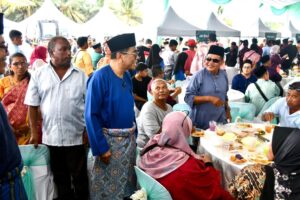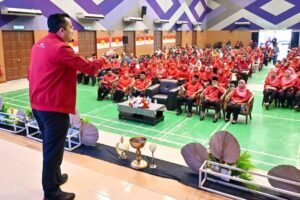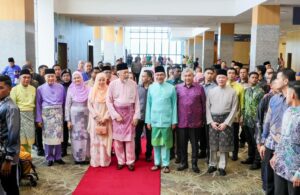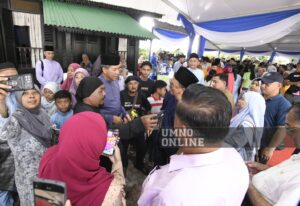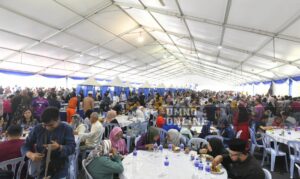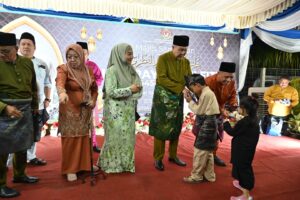UMNO : To Be Or Not To Be
UMNO celebrates its 73rd anniversary on May 11, struggling for position in local politics after its power being stripped off in GE14, strangled by Pakatan Harapan and choking from internal bleeding as a result of the defeat.
After 61 years in power, support seems to be fizzling out until the current regime is fast made to wrestle the confidence how they can deliver their manifesto promises. Perhaps there is a light at the end of the tunnel. For Umno and Barisan Nasional to recapture that glory again, much need to be done and many slaloms must be straightened.
While PH is not worth mentioning at this juncture, Umno must search for new remedies to not only heal the wounds but must also find new methods if it wants to become formidable again. With Zahid Hamidi as the president and Mohamad Hasan as his deputy, both are entrusted with effort to rebuild the ruin.
Perhaps they need to take an in-depth study at three focal points which I believe can uplift Umno’s position again. Beside doing away with old orthodox approach in party management, including at the headquarter’s administration, members and Malaysians at large must be treated as sanctioning voice to its relevance.
First, rebrand the way in building political and civic organisations – this will helps build the stable, broad-based and well-organized institutions that form the foundation of a strong civic culture. Democracy depends on these mediating institutions, which is the voice of an informed citizenry, which link citizens to their government and to one another by providing avenues for participation in public policy.
Next is safeguard elections. This will promote open and democratic elections in the party. In many parts of the world, political parties and governments study electoral codes and to recommend improvements, thus providing technical assistance for political parties and civic groups to conduct voter education campaigns and to organise activity monitoring programs.
Umno must also help the members and electorates to ensure that polling results reflect the will of the people.
Finally, promote openness and accountability within the party. This will result in a party which is more professional, accountable, open and responsive to their members and citizens. It also conveys a deeper message to new and emerging party-management while autocracies are inherently isolated and fearful of the outside world.
Umno also needs more volunteers at branch and divisional levels. Political skill is paramount as those involved – many of whom from the youth wing – should complement the upper circle in steering the political vehicle in the right direction.
The party, now with almost full cooperation from Pas – something to jolt the ruling PH government – should also emphasis on revamping old and saturated measures on how to win the people again, and not just banking on its ‘Malay-Islam’ bandwagon. Nobody would jump onto the ship should similar method in wooing people’s support is continuously subscribed.
After May 9 defeat, questions are being asked whether Umno can ever revive itself. The omens are not bright. The party’s state of uniformity is split and activists are restive.
Beneath suggestions for reform is unmistakable dissatisfaction with the democratically-elected leadership, especially the president who is plagued with 47 politically-motivated court cases and former premier Najib Razak gaining popular momentum amid his 42 cases of wrongdoings and corruption stemming from the 1MDB scandal.
Most important is for Umno to be freed from the label of being a corrupt and kleptocratic political party.
Discussions on ideology and detente have boiled down to the need to be pluralistic without being perceived as a Muslim party amid its cooperation with Pas. It must retain the minority vote without annoying the Chinese and Indians.
Umno is not being stigmatised by this labeling but a more prudent re-engineering must be done at every level of party management to get rid of the Malay-centric accusation made by DAP, PKR and Bersatu. Perhaps the manner in which it collaborated with MCA and MIC in the early days should come around more often now.
How it meets the leadership as well as the ideological challenges remain to be seen. The party would do well to recall some precedents of stunning revival of decaying political parties, locally and abroad. Lessons must be learn, fast!
It should also look to contributing upsurge in public support. An inspiring leadership, and attractive idea and as an effective political organisation. Until these are approved, the party will only see the mercenaries declining by the day.
I’ve observed the ups ad downs of many political parties around the world. Perhaps it is worth to pick India as an example because many Malaysian leaders used to ‘worship’ Modi’s leadership.
These three factors also explain how Indira Gandhi arrested the Congress decline, reflected in the 1967 elections, and revived its fortunes. She provided the leadership, gave an attractive slogan ‘gharibi hatao’ (banish poverty) and split the Congress in 1969 to weld her own faction into a power organisation. She won a landslide victory in 1971.
Winston Churchill’s shocking defeat in the 1945 general election drove not only the war hero himself but much of his party into depression. One man remained undaunted in adversity, and he was R.A.Butler. He realised that while the people loved the leaders, they did not approve of his domestic policies and considered him outdated.
A leader there was and the Conservative Party machine was strong enough to survive such a defeat. The failure was at the policy level. Butler repaired himself to the party office with just a secretary and skillfully filled the void. He then formulated policies which the electorate could accept.
Umno can also take cue from many other instances but in order to face the people again, it must redress the damage within. Without a solid show of unity, its difficult to convince them of the collaboration with Pas and perhaps other political parties too.
Leaders should not publicly squabbled, especially about leadership, over who should and should not leader the party. At this juncture, the issue of qualified leader should be a matter of dispose.
This is not just a romantic notion of state and central. I spent over a decade deeply involved in my state political party in Melaka and watched thousands of members licking stamps, passing out campaign brochures and sample ballots at polls, and participating in state conventions. Sadly, however, this kind of populist civic engagement has been stifled by over-regulation.
The regulations started with funding and spending restrictions first imposed by former regime in 1982. Over the next three decades, parties adapted and survived, but Umno imposed even more severe restrictions. The combined effect of these restrictions has proved so onerous that most branch and division cannot effectively engage in important grassroots activities.
As the Opposition now, Umno must come to its senses. There are old scabs to clear in order to rejuvenate again. At 73, it is perhaps among the few who still exist in the world. Members can be proud of the past achievements but must not be demoralised by what has taken place.
The answer lies in them, to proceed or not to proceed. However, the first option seems more demanding, and this quest must begin with cleaning it up from all dirt and stink. Face the fact that its everybody’s duty to do the patching, and it will be okay again.
PH is not an effective institutions, so prepare the necessaries… not the vice versa!
HAPPY 73rd ANNIVERSARY!
Jailani Harun

